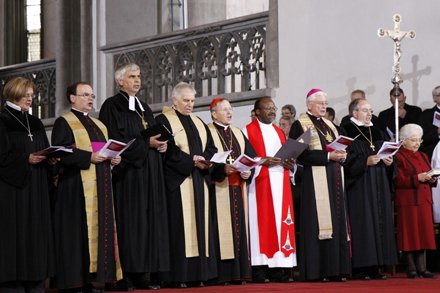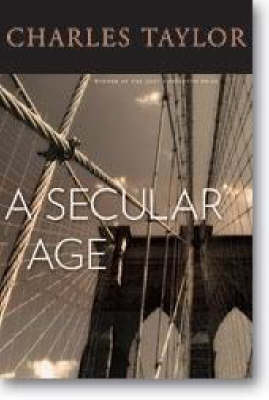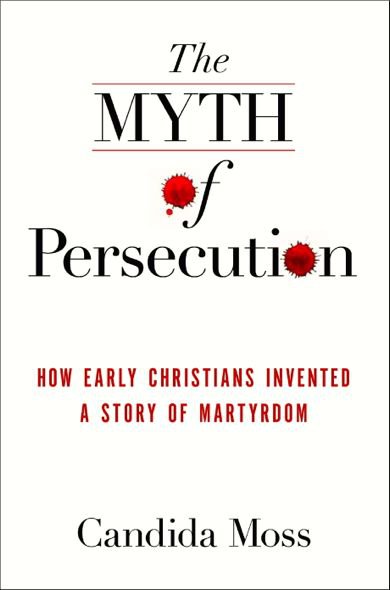
Artur Rosman has given us a masterful account of the difference between Catholic and Protestant imaginations in the way that they deal with sex scandals. As I begin this post, I give my obligatory thanks to him for letting me play a dialectical role to his “backward Catholic” analogical orientation. Of course, dialectics produce syntheses, so if you end up thinking that Artur and I are saying the same thing about Protestant and Catholic sex scandals, it means that the Hegelian joke’s on you. (In fact, you may find some synthesis in the writing. This is because Artur blogs in a genre that I think is unique to Cosmos the in Lost. If I stretch my voice to fit into his genre, it perhaps shows that imitation may well be the highest form of flattery.)
I do enjoy Artur’s differentiation of analogical and dialectical approaches to the sex scandals. But I also have a bone to pick with Artur.
Let me let the cat out of the bag. Artur’s rendition of the various approaches to scandal have very little room for an account of ecumenism that takes Catholics and Protestants alike outside of their own theological worlds into a middle space of conversation. This is because, as I shall argue, both Catholics and Protestants seem to have dealt with their contemporary scandals by coming to a consensus that religion should be privately governed. What’s funny about this is that this private consensus is ironically ecumenical, though one that Catholics and Protestants alike may not consider worth celebrating by the time I get through it.
Consider this: regardless of whether scandals implicate a whole hierarchy outside of a congregation (in a Catholic analogical imagination) or whether it’s kept under wraps inside one congregation (in a Protestant dialectical imagination), there is something bigger that holds both contemporary Catholics and Protestants together. It’s this: both conceptualize religion as outside of the purview of any public governance or even conversation, be it the state, civil society, the circulatory networks of the public sphere, or whatever.
That is why abuse is so seldom reported to the civil authorities. That is why the first impulse is to deny that anything ever happened. That is why the next impulse is often to have a closed-door meeting.
And all of this, I am arguing, is the exercise of a political theology common to both Catholics and Protestants.
This political theology is what I’m calling the private consensus. By the private consensus, what I mean is the implicit agreement in American religious circles since around the 1970s that it’s better to do things in house than to let a secular civil society, the state, and other religious communities with different theological imaginations get involved, lest they, say, misunderstand our theological imagination. I perfectly understand that there are Catholic and Protestant scandals outside of America that operate this way. Maybe I’ll take the private consensus show on the road some time.

But as I am considering it, the private consensus is precisely what has made something like the American culture wars possible. Consider Charles Taylor on the culture wars in A Secular Age:
And so we have the contemporary Kulturkampf, particularly in the U.S.A., in which some churches are induced to take on the “secular world” on some issues of sexual ethics, often narrowly defined; which leads to a condemnation of other Christians who are reluctant to be recruited into this Crusade, and hence to a kind of civil war in the Church. (Taylor, p. 766).
Now consider what Taylor is saying in the context of his whole argument. By p. 766, if we’ve managed to read the whole tome, we are already familiar with Taylor’s nova effect, that secularity is in fact not about the decline of religion, per se, but the proliferation of individual spiritual quests. For Taylor, secularization is a qualitative phenomenon, one in which religion has become radically privatized to the point where it’s just about the individual and his or her private search for meaning. Any external structure should not be getting in the way of such sublimely private quests. (Taylor is unsparing in his longue durée sweep, by the way: neither Protestants nor Catholics escape the shrapnel of the nova effect. My favorite line in the whole book is Taylor’s analysis of Pius IX ‘fulminating’ in the Syllabus of Errors and yet playing straight into the nova effect by positing a dialectic between ‘the horizon of faith’ and ‘human ends,’ p. 569-70.)
Before you take me to task and say that Taylor’s longue durée indicates that the private consensus has been around since the dawn of modernity, let me emphasize that what I mean by the private consensus broadly dovetails with Taylor’s account of the ethics of authenticity. As Taylor argues, by the 1960s and onward (he goes a decade earlier than my comfort level), there is such radical individuation from the nova effect of secularization that ‘self-orientation seems to have become a mass phenomenon’ (Taylor, p. 473). Dovetailing with Talal Asad’s Formations of the Secular where Asad goes on a riff on why S&M is perfectly OK in a secular framework because private pleasure however you like it never hurt anybody, Taylor suggests by the end of his lengthy account that the next place to move is an examination of sexuality in a secular age. Religion and sex become located in the same metaphorical geography, then: the private sphere.
In the conditions of belief that Taylor describes, there isn’t much room to theologize about the public scandal of religion. In fact, these conditions of belief create a climate in which talking about religious scandals is treated as an act of intrusion, a break-in to the private sphere. This is why scandals have to be kept under wraps in cases as diverse as Catholic bishops moving pedophile priests around dioceses, Sovereign Grace Ministries telling victims of sexual abuse to forgive the perpetrators, and the constant push of sites like Recovering Grace to get Bill Gothard to personally repent instead of trying to find ways to get investigative journalists and the state involved in prosecuting him. This is why the first impulse of Catholics and Protestants alike tends to be to defend the institution, sometimes with the advice of lawyers. This is why the revelations are devastating: not only does it make a mockery of the culture wars and the moral high ground that some Catholics and Protestants claim on sexuality, but it represents the full-frontal assault of Catholic and Protestant private strongholds. This is also why scandals are so juicy: as much as the conditions of belief make revelations about sex and sexuality juicy material in the public sphere, cases of religion and sex are juicy private leaks that simultaneously entertain the public while striking fear into hearts that value the private consensus for what they’re keeping under wraps.
In short, the private consensus creates the conditions in which any revelation of scandal is treated as an intrusion into the privacy of religion. If John Paul II talked about the ‘ecumenism of the martyrs,’ then I’m talking about the ecumenism of the martyrs of the private consensus.

Some people will hate me and others will love me for sounding like Candida Moss in The Myth of Persecution. But the point is that if the private consensus is the point of ecumenical intersection between Catholics and Protestants, then the private consensus must be thoroughly interrogated as a theology (a grounded theology, to be exact). Indeed, borrowing from John Milbank’s Theology and Social Theory, for all the talk about how the state must be using scandals to police the sublime, a better reading of Milbank might be that Catholics and Protestants in the private consensus have perfected the art of policing themselves theologically.
With such an interrogation, perhaps the private consensus will continue to unravel, as I have argued elsewhere that it already has been. And perhaps then, the task of Ut Unum Sint will shift to something more orthodox, prophetically evangelical, and truly catholic.
POSTSCRIPT: By the way, Ut Unum Sint is mostly about Catholic-Orthodox ecumenism. Artur is right on this score: the Ukrainian Orthodox protests do provide a model for the unraveling of the private consensus and thus, perhaps a new mode of ecumenism.











